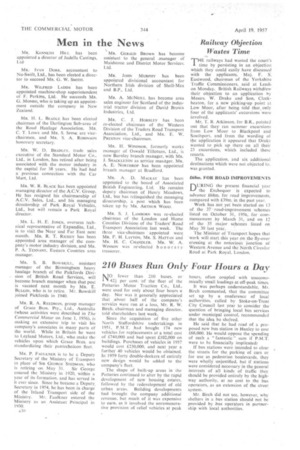210 Buses Run Only Four Hours a Day
Page 32

If you've noticed an error in this article please click here to report it so we can fix it.
MO fewer than 210 buses. or
421 per cent. of the fleet of the Potteries Motor Traction Co., Ltd., were used for only about four hours a day. Nor was it generally appreciated that about half of the company's services were run at a loss, Mr. R. W. Birch. chairman and managing director, told shareholders last week.
Since the acquisition of five other North Staffordshire undertakings in 1951, P.M.T. had bought 174 new vehicles for replacements at a total cost of £740,000 and had spent £102,000 on buildings. Purchases of vehicles in 1957 would cost £230,000, and next year a further 40 vehicles would be obtained. In 1959 forty double-deckers of entirely new design would be added to the company's fleet.
The shape of built-up areas in the Potteries continued to alter by the rapid development of new housing estates. followed by the redevelopment of old urban areas. Building developments had brought the company additional revenue, but much of it was expensive to earn, as it involved the unremunerafive provision of relief vehicles at peak hours, often coupled with uneconomically small loadings at off-peak times.
It was perhaps understandable. Mr. Birch commented, that the committee set up by a conference of local authorities, called by Stoke-on-Trent City Council last year to consider the question of bringing local bus services under municipal control, recommended that the idea be shelved.
He said that he had read of a proposed new bus station in Hanley to cost 166,000. He would oppose the spending of such a " fantastic " sum if P.M.T. were to be financially implicated!
If bus stations were intended to clear the streets for the parking of cars or for use as pedestrian boulevards, they were wholly unjustified, but if stations were considered necessary in the genera! interests of all kinds of traffic they should be provided entirely by the highway authority, at no cost to the bus operators, as an extension of the street system.
Mr. Birch did not see, however, why shelters in a bus station should not be provided by bus operators in partnership with local authorities.




























































































